
Richard Semler Barthelmess was an American film actor, principally of the Hollywood silent era. He starred opposite Lillian Gish in D. W. Griffith's Broken Blossoms (1919) and Way Down East (1920) and was among the founders of the Academy of Motion Picture Arts and Sciences in 1927. The following year, he was nominated for the Academy Award for Best Actor for two films: The Patent Leather Kid and The Noose.
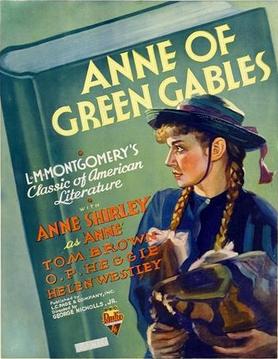
Anne of Green Gables is a 1934 American comedy drama film directed by George Nicholls, Jr., based upon the 1908 novel Anne of Green Gables by Canadian author Lucy Maud Montgomery. Dawn O'Day, who portrayed the title character in the film, changed her stage name to Anne Shirley, which she was billed as for this and all subsequent roles. The film was a surprise hit, becoming one of four top-grossing films RKO made that year as noted in The R.K.O. Story, published by Arlington House.
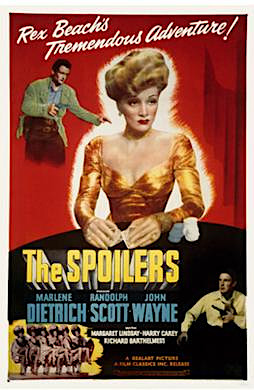
The Spoilers is a 1942 American Western film directed by Ray Enright and starring Marlene Dietrich, Randolph Scott and John Wayne.
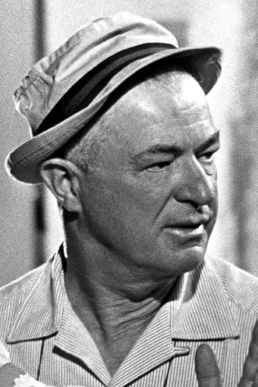
Naftuli Hertz "Nathan" Juran was an Austro-Hungarian-born film art director, and later film and television director. As an art director, he won the Oscar for Best Art Direction in 1942 for How Green Was My Valley, along with Richard Day and Thomas Little. His work on The Razor's Edge in 1946 also received an Academy nomination. In the 1950s, he began to direct, and was known for science fiction and fantasy films such as Attack of the 50 Foot Woman. He was also the brother of quality guru Joseph M. Juran.
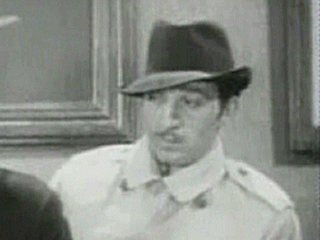
The Stolen Jools is a 1931 American pre-Code comedy short produced by the Masquers Club of Hollywood, featuring many cameo appearances by film stars of the day. The stars appeared in the film, distributed by Paramount Pictures, to raise funds for the National Vaudeville Artists Tuberculosis Sanitarium. The UCLA Film and Television Archive entry for this film says—as do the credits—that the film was co-sponsored by Chesterfield cigarettes to support the "fine work" of the NVA sanitarium.
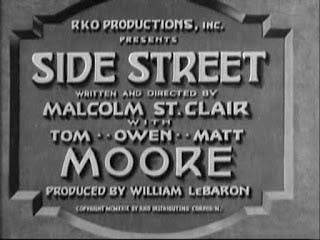
Side Street is a 1929 American Pre-Code film featuring the only screen teaming of all three Moore Brothers, each of them major silent film stars. George Raft also makes an uncredited appearance as a professional dancer — which Raft was at the time — dancing to the song "Take a Look at Her Now", sung by June Clyde. Side Street was directed by Malcolm St. Clair with a screenplay by George O'Hara and Jane Murfin, based on a story by St. Clair, which was adapted by John Russell.

The Over-the-Hill Gang Rides Again starring Walter Brennan and Fred Astaire is a 1970 ABC Movie of the Week sequel to the Western comedy The Over-the-Hill Gang. The supporting cast includes Edgar Buchanan, Andy Devine, Chill Wills, Lana Wood, and Burt Mustin. Like the 1969 original, the sequel involves a group of aging Texas Rangers and was written by Richard Carr and directed by George McCowan.

Copacabana is a 1947 American musical comedy film directed by Alfred E. Green starring Carmen Miranda, Groucho Marx and Steve Cochran. The film is a showcase for Miranda, who performs several numbers in her usual style, including a high-energy rendition of "Tico-Tico". Groucho, as Lionel, her fiance and agent, also sings a musical number, "Go West, Young Man", wearing his traditional greasepaint brows, mustache, and baggy suit. This was Groucho's first significant film appearance as a solo act, minus Harpo and Chico.

Heroes for Sale (1933) is an American pre-Code drama film directed by William Wellman, starring Richard Barthelmess, Aline MacMahon, and Loretta Young, and released by Warner Bros. and First National Pictures. The 76-minute original is considered lost; a 71-minute version is available from Turner Entertainment.
Edward Black was a British film producer, best known for being head of production at Gainsborough Studios in the late 1930s and early 1940s, during which time he oversaw production of the Gainsborough melodramas. He also produced such classic films as The Lady Vanishes (1938).

Rawhide is a 1938 American Western film starring Lou Gehrig and released by 20th Century-Fox. It was directed by Ray Taylor and produced by Sol Lesser from a screenplay by Jack Natteford and Daniel Jarrett. The cinematography was by Allen Q. Thompson. This is the only Hollywood movie in which baseball great Lou Gehrig made a screen appearance, playing himself as a vacationing ballplayer visiting his sister Peggy on a ranch in the fictional town of Rawhide, Montana. The film remains available on DVD and VHS formats.

Twin Beds is a 1942 American comedy film directed by Tim Whelan, and starring by George Brent and Joan Bennett. It was distributed by United Artists. The screenplay was written by Kenneth Earl, Curtis Kenyon and Eddie Moran, based on the play of the same name by Salisbury Field and Margaret Mayo.

Arbor Day is a 1936 Our Gang short comedy film directed by Fred C. Newmeyer. It was the 145th Our Gang short to be released.
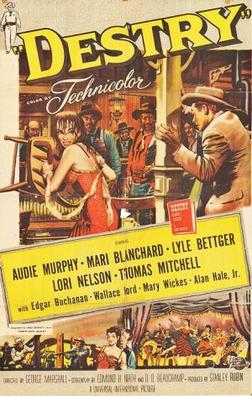
Destry is a 1954 American western film directed by George Marshall and starring Audie Murphy, Mari Blanchard, Lyle Bettger and Thomas Mitchell.
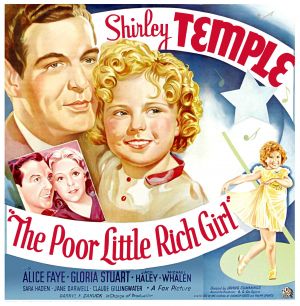
Poor Little Rich Girl, advertised as The Poor Little Rich Girl, is a 1936 American musical film directed by Irving Cummings and starring Shirley Temple, Alice Faye and Jack Haley. The screenplay by Sam Hellman, Gladys Lehman, and Harry Tugend was based on stories by Eleanor Gates and Ralph Spence, and the 1917 Mary Pickford vehicle of the same name. The film focuses on a child (Temple) neglected by her rich and busy father. She meets two vaudeville performers and becomes a radio singing star. The film received a lukewarm critical reception from The New York Times.

The Little Shepherd of Kingdom Come is an American CinemaScope Western film directed by Andrew V. McLaglen. It stars Jimmie Rodgers and Luana Patten and includes the film debut of George Kennedy.
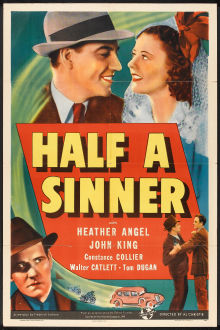
Half a Sinner is a 1940 American comedy crime film directed by Al Christie. It stars Heather Angel as a schoolteacher who in one day becomes Public Enemy Number One in Pennsylvania. The film is based on Dalton Trumbo's short story "Lady Takes a Chance". The working titles of this film were Everything Happens to Ann and The Lady Takes a Chance.

Weary River is a 1929 American sound part-talkie romantic drama film directed by Frank Lloyd and starring Richard Barthelmess, Betty Compson, and William Holden. The film was produced and distributed by First National Pictures. In addition to sequences with audible dialogue or talking sequences, the film features a synchronized musical score, singing and sound effects along with English intertitles. The soundtrack was recorded using the Vitaphone sound-on-disc system.
Four Jacks and a Jill is a 1942 musical comedy film starring Ray Bolger, Anne Shirley, June Havoc and Desi Arnaz.

The Seventh Day is a 1922 American silent drama film directed by Henry King and starring Richard Barthelmess, Louise Huff, Frank Losee and Anne Cornwall. A group of high society New Yorkers on a yachting vacation put into a small New England fishing village for repairs. While there they strike up relationships with locals that threaten the harmony of their party.


















